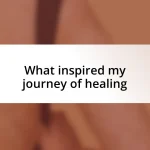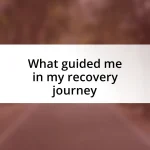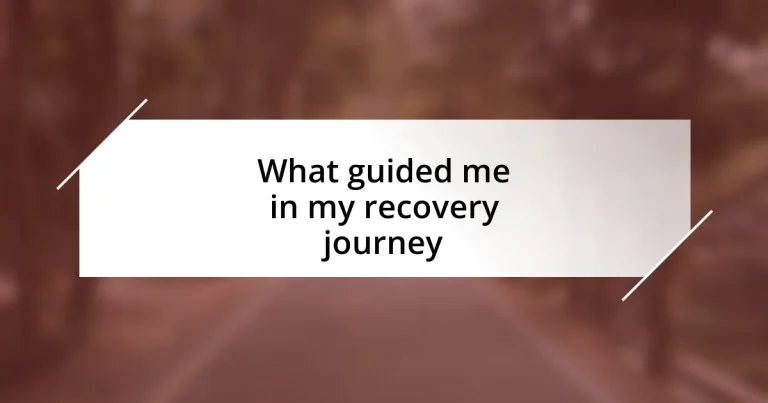Key takeaways:
- Embracing cycles of healing and acknowledging feelings is essential for personal growth during recovery.
- Identifying personal motivations, such as family connections and creativity, provides direction and clarity in the recovery process.
- Seeking support from various sources fosters community and resilience; sharing struggles can alleviate feelings of isolation.
- Celebrating small milestones and achievements reinforces positive progress and helps maintain motivation throughout the recovery journey.
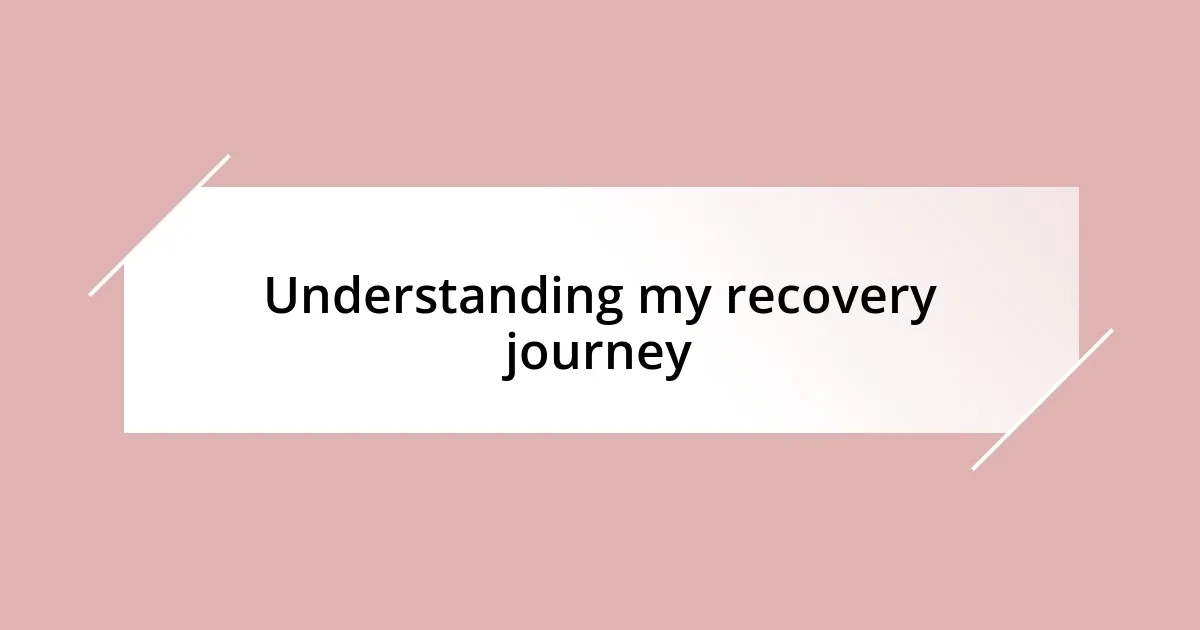
Understanding my recovery journey
Understanding my recovery journey was like peeling back the layers of an onion. I can still remember those moments of clarity, where I finally recognized that each setback didn’t negate my progress but rather enriched it. Have you ever felt like you were stuck in a cycle? I certainly did, but learning to embrace those cycles became a pivotal part of my healing.
There was a time when the weight of my struggles felt unbearable, making me wonder if I’d ever truly feel free. I recall sitting in my car, tears streaming down my face, wondering why it was so hard to let go. In that moment, I realized that recognizing my feelings—no matter how painful—was essential for my understanding. How can we move forward if we don’t acknowledge where we’ve been?
As I navigated this journey, I found solace in journaling. Writing became a safe space where I could pour out my thoughts and fears without judgment. In those pages, I discovered insights about myself that I never knew existed. It’s incredible how articulating our experiences can clarify our perceptions. Have you ever tried to put your experiences into words? You might be surprised at what you uncover about yourself.
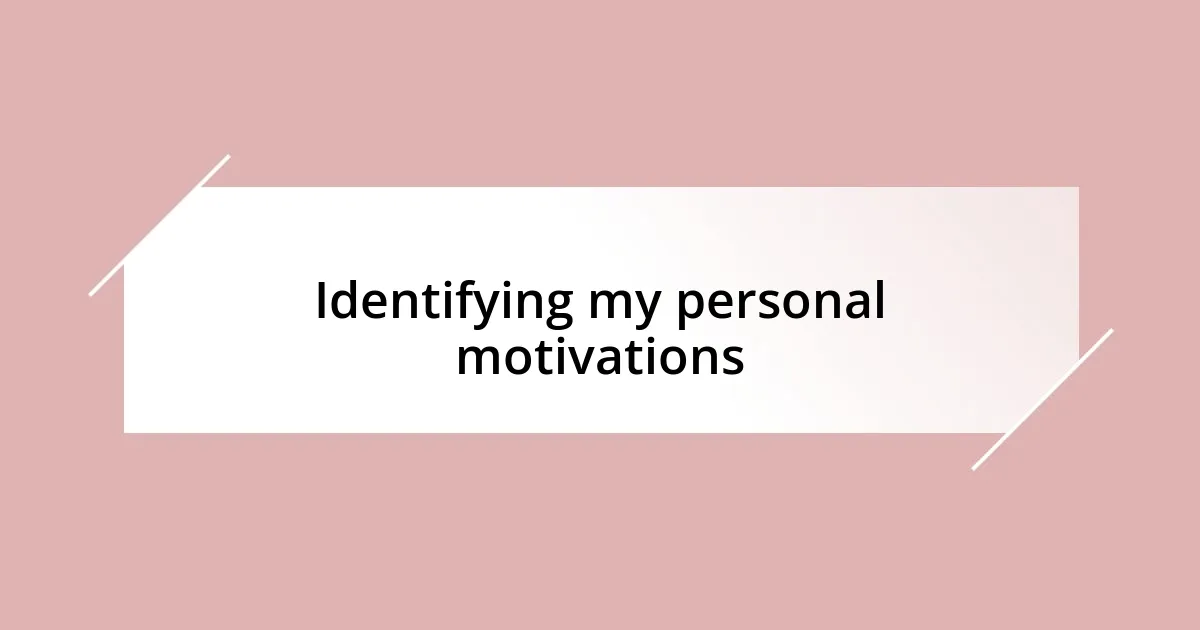
Identifying my personal motivations
When I took a step back to examine what truly motivated me, I was surprised by the depth of my feelings. I realized that my motivations weren’t just about wanting to recover; they were tied to my dreams and the parts of life I longed to engage with again. In one enlightening moment, I pictured myself hiking a trail on a beautiful sunny day. I could almost feel the warm sun on my skin and the fresh air filling my lungs. That vision became a beacon for me, a reminder that recovery wasn’t just an endpoint but a pathway to reconnecting with what I loved.
Here are some of the personal motivations I identified along my journey:
- Family Connections: Rebuilding relationships with my loved ones and being fully present in their lives.
- Self-Discovery: Uncovering the aspects of myself that I had lost or neglected during difficult times.
- Adventure: The desire to travel and explore new places, soaking in the world around me.
- Health and Vitality: Feeling energized and healthy enough to participate in activities I once enjoyed.
- Creativity: Returning to hobbies like painting and writing that brought me joy and helped me express my emotions.
Recognizing these motivations has not only fueled my journey but has also brought clarity and direction to my path forward. Each one serves as a stepping stone, guiding me toward the life I aspire to live.
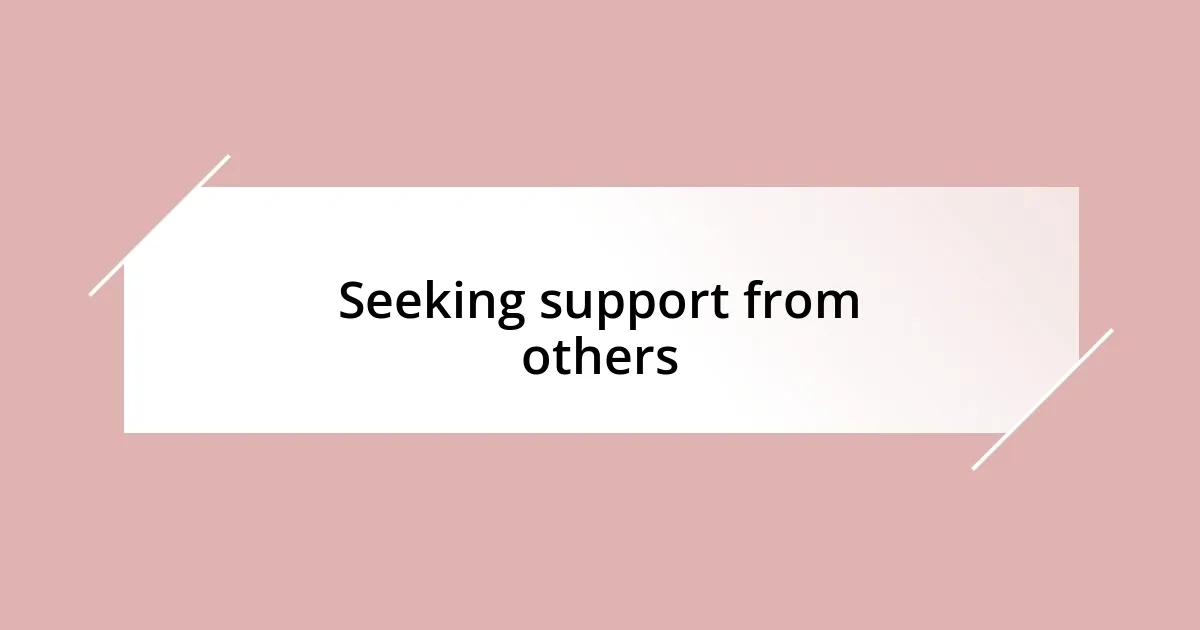
Seeking support from others
Seeking support during my recovery journey was incredibly transformative. I vividly remember attending my first support group, feeling a mix of excitement and dread. The moment I shared my story, I was met with nods and understanding glances. It was a powerful reminder that I wasn’t alone. Isn’t it amazing how connecting with others who have experienced similar struggles can lift some of that weight off your shoulders? Engaging with a community creates a shared sense of empathy that fosters healing.
Sometimes the most supportive people I found were the ones I least expected. I recall sitting on my couch, sharing my challenges with a friend over coffee. As I opened up, I felt this rush of relief wash over me, almost like a warm blanket of understanding. This conversation deepened our bond and made me realize that vulnerability can pave the way for strong connections. Have you ever surprised yourself with the solace you find in unexpected places?
It’s important to explore various support avenues—friends, family, therapists, or even online communities. Each brings a unique perspective and experience to the table. I benefited immensely from having a mentor who guided me through tough spots, providing advice that felt tailored to my journey. The dynamic of support varies; sometimes it’s about deep discussions, while other times it’s simply sharing a laugh that takes your mind off things. What types of support resonate most with you?
| Type of Support | Benefits |
|---|---|
| Support Groups | Shared experiences create a sense of belonging and understanding. |
| Friends and Family | Emotional support and encouragement to navigate through challenges. |
| Therapists/Counselors | Professional guidance tailored to individual needs and coping strategies. |
| Online Communities | Accessibility to diverse insights and anonymity that can ease sharing. |
| Mentors | Personalized advice and encouragement based on their own experiences. |
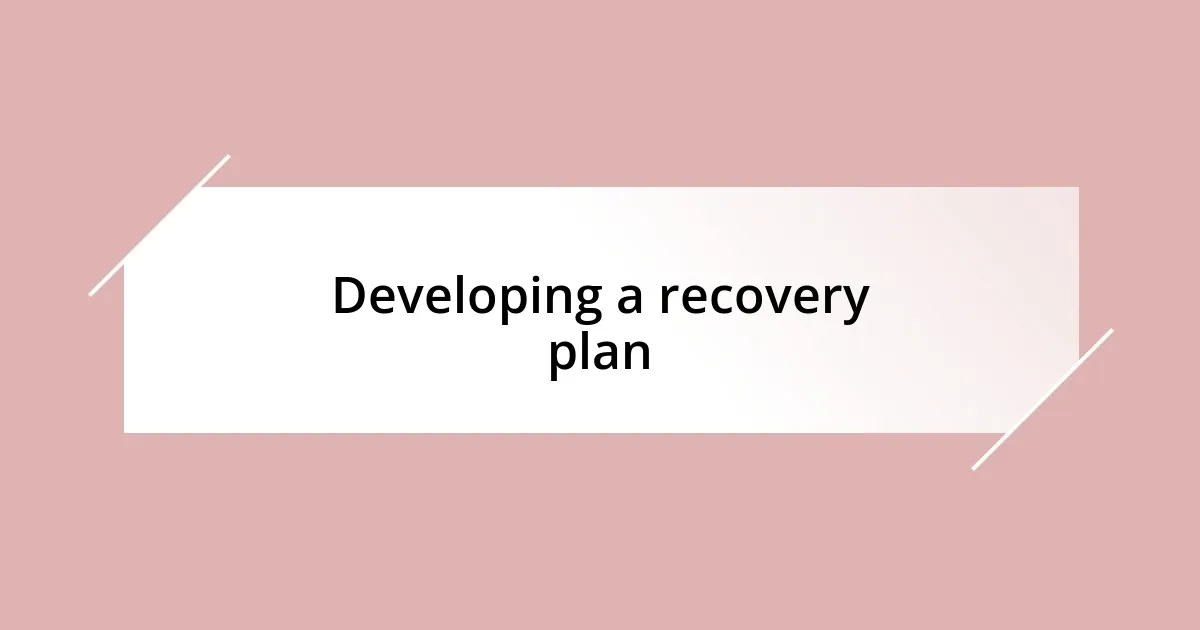
Developing a recovery plan
Developing a recovery plan felt like laying out a treasure map to my dreams. I started by jotting down practical goals, breaking them into smaller, manageable steps. For instance, instead of just saying, “I want to feel better,” I wrote, “I will go for a 10-minute walk every day this week.” This tangible approach transformed my journey, turning vague aspirations into clear actions.
Reflecting on my experiences, I found it essential to incorporate enjoyable activities into my recovery plan. I decided to schedule time each week for painting, an outlet that revitalized my spirit. One afternoon, I explored a nearby park with my sketchbook. As I captured nature on the page, I felt my worries lift. Does integrating joy into your plan resonate with you? I believe it’s vital—after all, recovery should encompass moments of happiness, too.
Lastly, I learned that flexibility is crucial in any recovery plan. Life is unpredictable, and I encountered days when motivation waned. I remember a week where I struggled to complete my goals. Rather than feeling defeated, I adjusted my plan to include gentle self-care activities, like reading a comforting book or enjoying a warm bath. Have you ever had to pivot in your journey? Embracing change allowed me to celebrate resilience instead of viewing setbacks as failures.
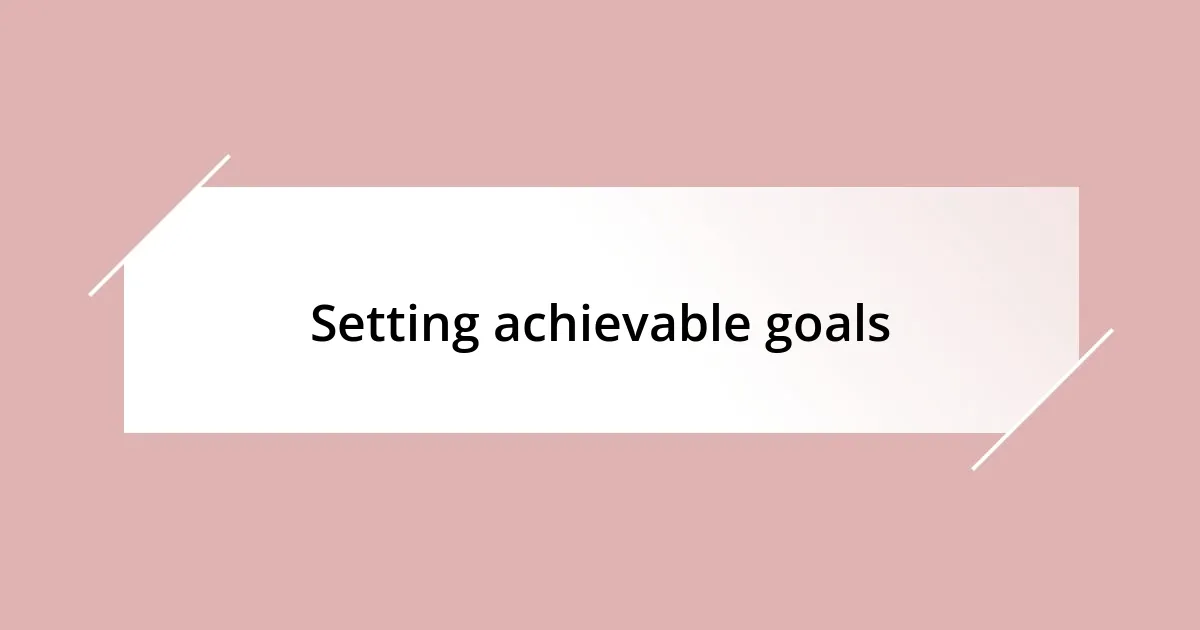
Setting achievable goals
Setting achievable goals transformed my recovery journey into something tangible. I remember one day, sitting with a cup of tea, feeling lost and overwhelmed. Instead of being discouraged by the bigger picture, I decided to focus on a single goal: “I will write three things I’m grateful for every morning.” This small commitment felt empowering and built positive momentum. Have you ever noticed how small changes can spark significant growth?
As I continued to set goals, I learned the importance of celebrating each milestone, no matter how small. I vividly recall completing my first week of daily gratitude journaling. I treated myself to a favorite dessert, giving myself a moment to relish the achievement. It’s fascinating how acknowledging accomplishments can fuel further progress, isn’t it? These little celebrations serve as reminders that every step counts.
Over time, I began to adjust my goals based on what I learned about myself and my journey. One month, I recognized that I was consistently ignoring my physical health. So, I set a more specific goal: “I will attend a yoga class twice a week.” This not only improved my well-being but also introduced me to a supportive community. I found that setting achievable goals isn’t just about ticking boxes; it’s about understanding my evolving needs and embracing the adventure that recovery truly is. How have your goals shaped your path?
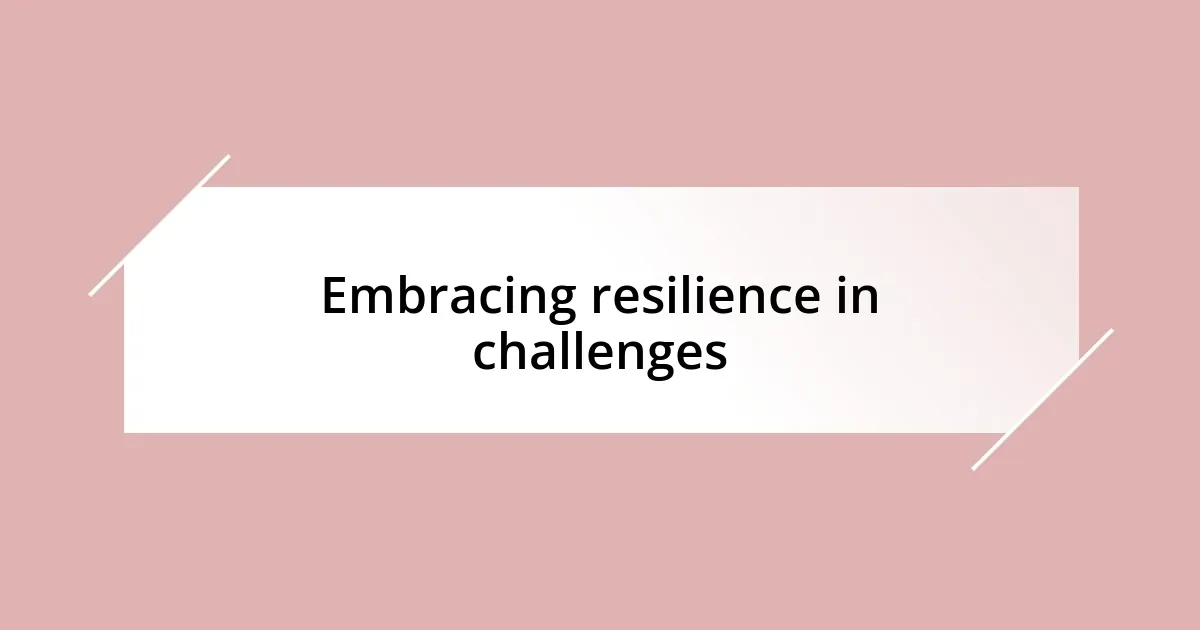
Embracing resilience in challenges
Embracing resilience during challenges has been a cornerstone of my recovery journey. I remember a day when everything felt like an uphill battle. Instead of succumbing to despair, I chose to identify one small thing I could control—making my bed each morning. It sounds simple, but that tiny act fostered a sense of accomplishment and set a positive tone for the day. Have you ever noticed how small victories can create a ripple effect in your mindset?
There were moments when obstacles seemed insurmountable, dragging me down into a pit of frustration. In one of those low times, I turned to my journal, pouring out my thoughts. As I spilled my feelings onto the page, something surprising happened: I found clarity. I realized that facing my challenges with honesty—the good, the bad, and the ugly—helped me build a mental toolkit for resilience. Can’t you see how powerful vulnerability can be in building strength?
The power of community also became evident during my toughest times. I vividly recall attending a support group where sharing my struggles felt like peeling away layers of solitude. Listening to others’ stories inspired me to not only embrace my own challenges but also offer support to someone else in return. This exchange brought a profound sense of belonging and resilience that reminded me: we’re really all in this together. Have you found strength in the connections you’ve made on your journey?
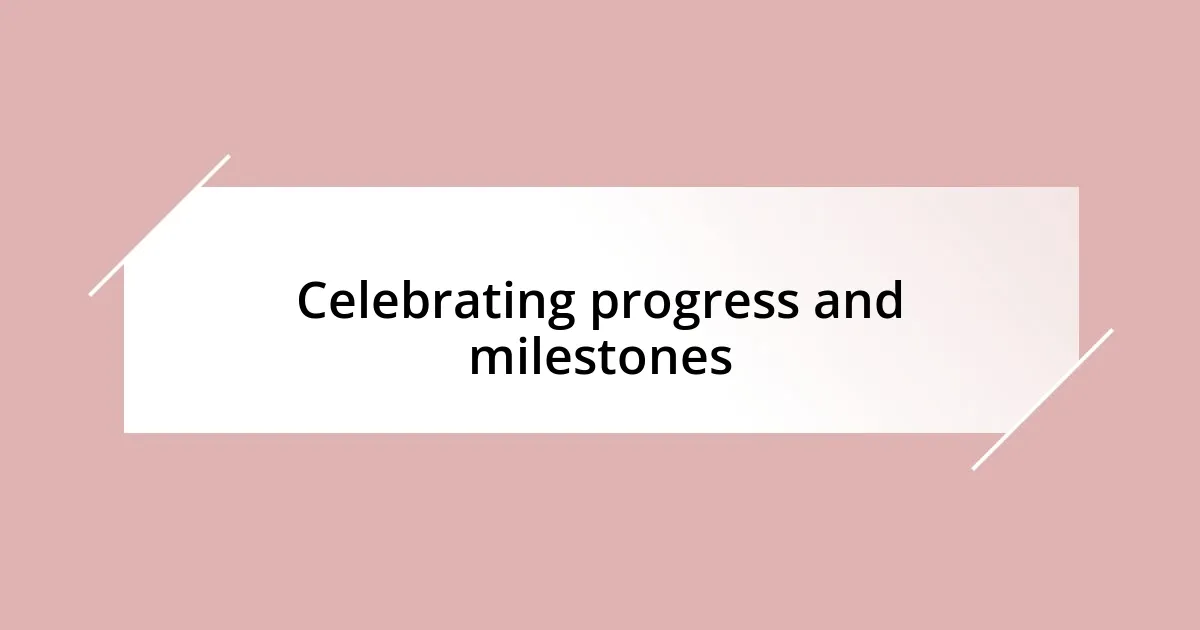
Celebrating progress and milestones
Recognizing and celebrating milestones is vital in any recovery journey. I remember the day I hit the six-month mark of my sobriety. Instead of glossing over it, I threw a small gathering with close friends. It was such a fulfilling moment, surrounded by those who uplifted me, and it really drove home the meaning of progress. Have you ever paused to honor your journey, no matter how far you’ve come?
Every achievement deserves acknowledgment, no matter how minor it may seem. I’ll never forget when I managed to complete my first book after struggling with my reading for years. It felt monumental! I bought myself a beautiful new bookmark as a token of that success. It was more than just a gesture; it reinforced my belief that every step taken is a vital piece of the puzzle that contributes to our growth. How do you celebrate your own accomplishments?
Celebrating progress can also be about creating new traditions that symbolize your journey. For example, I now reserve the last day of each month as a personal reflection day. It’s a moment for me to look back at what I’ve achieved, no matter how big or small, and to plan ahead. This simple act has become both a reward and a source of motivation for me. Can you think of a way to incorporate your own celebrations into your recovery routine?

